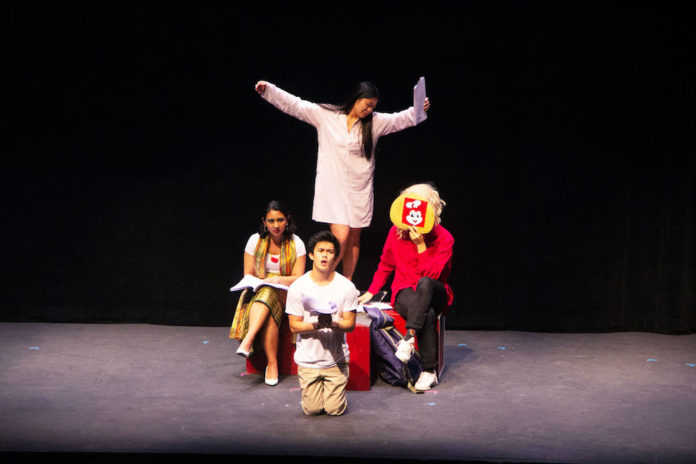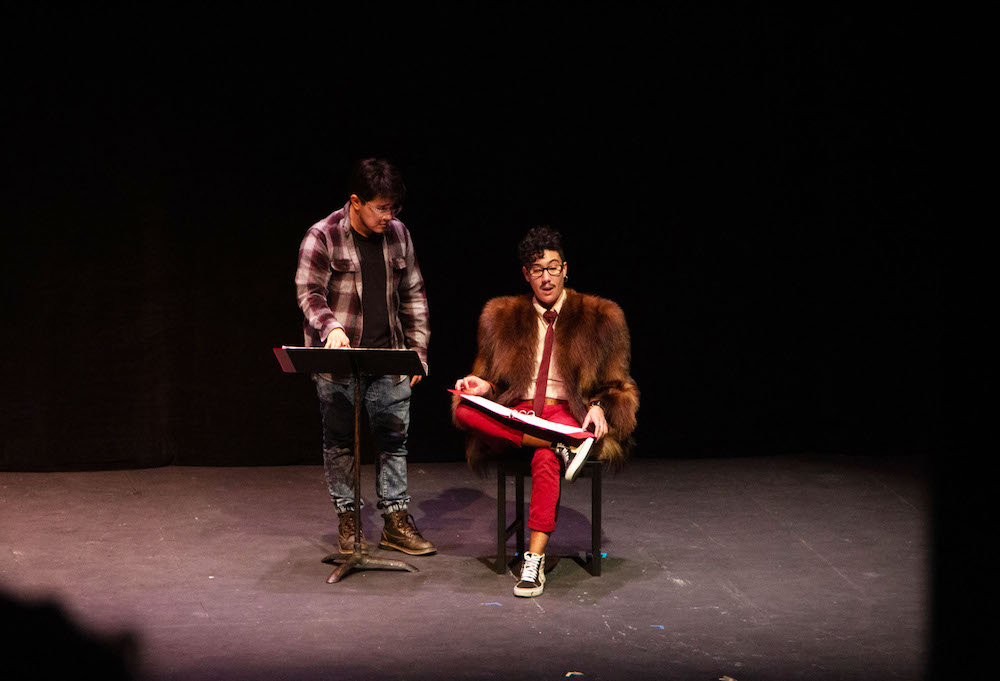
Occidental College hosted its 22nd annual New Play Festival Feb. 22–23 in Keck Theater, featuring four student-written plays. This year, the plays were “This One’s for My People with Vaginismus” by Asher Tessier (senior), “Pogi Boy” by Sergio Perez (senior), “How to Get a 4.0” by Molly Kauffman (senior) and “Date Night, The Play!” by Elliott Moore (senior). Manny Rothman* (sophomore), Thomas Sliskovich (sophomore) and theater professor Laural Meade produced this year’s festival.
According to Meade, the process of planning the New Play Festival began at the end of the Fall 2019 semester when students submitted their plays. At the beginning of the spring semester, a committee of theater department professors read and selected the plays to be performed at the festival. Meade said she then paired each of the playwrights with a guest director from the LA area. Then, the playwrights had a series of three rehearsals to hear notes from Meade, actors and directors and to rewrite sections of their play.
According to Rothman, student producers played a big role in the planning process. Rothman said they were in charge of hiring personnel, such as stage managers, board operators and lighting designers. Rothman and Sliskovich also handled communication between playwrights and guest directors.
Tessier wrote and Jer Adrianne Lelliott directed the first play of the festival, “This One’s for My People with Vaginismus.” The play told the story of Robert, a transgender man whose internalized transphobia and trauma complicate his relationship with his vagina. According to Lelliott, working with Tessier inspired her due to their shared interest in queer subject matter.
“There’s such a limited story for what a trans man is,” Lelliott said. “So much of us feel that we don’t fit in anywhere and that has to do with us being compared to one notion of what it must be [to be transgender].”
Tessier said he wanted to write a story about a transgender man dealing with vaginismus to help him work through his own issues.
“I needed a story about how trauma can be something productive in a person’s life and not just this harrowing terrible thing,” Tessier said. “But it can also really lead to learning about yourself and getting closer to yourself.”
According to Tessier, striking the balance between comedy and melodrama was an essential part of portraying serious topics such as trauma and internalized transphobia.
“You want to have a distinct separation between your funny moments and your sad moments because if it goes too much one direction, that’s where you get into melodrama or just a straight-up farce,” Tessier said. “For every intense part that I have written in, I want to balance it out with a laugh out loud moment.”

“Pogi Boy,” the second play of the festival, was directed by Giovanni Ortegaand written by Perez. The play centered around a Filipino boy who searches for the courage to come out to his father through the help of two spirit guides: Jesus and a babaylan named Tala.
According to Perez, the lack of Filipino coming-out stories inspired him to create “Pogi Boy.”
“If there’s nothing out there for me, if I can’t see myself on stage, I’m gonna write myself a role,” Perez said.
According to Ortega, a big part of working with Perez was respecting and cultivating his vision.
“As a director, I feel that a playwright should always be respected and heard in the first few iterations of their piece because it’s still kind of ruminating,” Ortega said. “My job is to just take that universe outside of their head and be the architect and try to create a three-dimensional being on stage.”
According to Perez, the climax of the play, a confrontation between Gabriel, Tala and Jesus, came to him during the fifth draft.
“It became about spirituality and identity that you find within these things that are bigger than you are,” Perez said.

Kauffman and Elisa Bocanegra collaborated to stage the third play of the festival, “How to Get a 4.0.” This play was about an unlikely friendship between a nerdy scientist named Cora and a quirky magician, Juniper.
According to Kauffman, the inspiration for the main characters came from two parts of herself, which helped her create characters that were three-dimensional.
“I really care about having fun, dynamic female characters,” Kauffman said. “It’s important to me for Juniper’s ability to be quirky and fun is based on what she says and does and not how she looks.”
Bocanegra said she appreciated the bond between Cora and Juniper.
“It’s about two people finding each other,” Bocanegra said. “No matter how different they are, there’s the connection that they have. There was a loneliness that they both have.”
The final play of the festival was “Date Night.” Alana Dietze ’07 directed the play and Moore wrote it. According to Moore, the concept for the play started out as a love triangle in front of communal showers in a dorm room.
“I wanted to amuse myself,” Moore said. “I wanted it to be kind of an old-style farce, but set now and have it be a little bit more relatable, especially to an Oxy audience.”
Dietze said she responded to Moore’s comedy but also to the heart of the story. According to Dietze, much of the rewrite process centered around making the main couple’s relationship as strong as possible.
According to Moore, playwriting inspiration comes from everywhere.
“Write about things that you like that you think are funny,” Moore said. “Write it down when it comes into your brain. Write it on your phone, on your hand. Sometimes I’ll be in an elevator and I’m like, ‘I got it!’ And then later it becomes a play.”
*Manny Rothman is a web designer for The Occidental.
![]()






























